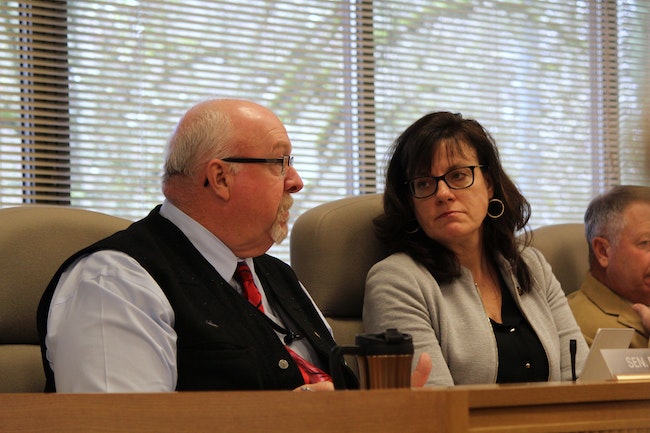 Sen. Lynn Findley, R-Vale, (left) asks his colleagues whether $5 million is truly enough to fund the state’s response to the ongoing outbreak of COVID-19. (Sam Stites/Oregon Capital Bureau)
Sen. Lynn Findley, R-Vale, (left) asks his colleagues whether $5 million is truly enough to fund the state’s response to the ongoing outbreak of COVID-19. (Sam Stites/Oregon Capital Bureau)
SALEM – The legislative Emergency Board Monday approved emergency allocations, including $11.5 million for flood relief in the Pendleton area, $5 million for COVID-19 efforts, and $2.7 million for the Office of Emergency Management to implement new preparedness programs.
They acted a day after the 2020 Legislature adjourned automatically. The absence of Republican legislators in the days before the adjournment prevented any votes on funding needs or other legislation.
But at Monday’s Emergency Board meeting, all seven Republicans were present and engaged.
The $11.5 million for flood relief includes $2 million for new affordable housing units for Umatilla County flood victims and $1.5 million for rapid rehousing and rental assistance to flood victims. Another $4 million would be used for replacing damaged housing and infrastructure.
The Oregon Business Development Department will receive $3.2 million for business cleanup and to help Pendleton repairs its levee.
The committee approved the COVID-19 funding without specifying how it would be used.
Sen. Lynn Findley, R-Vale, pointed out that Washington state had requested an estimated $100 million to bolster its response to the virus. He also said he spoke with several county health officials in his vast district covering much of eastern Oregon and they asked him whether there would be any assistance for them.
“They’re on the front lines, and they need some help,” Findley said.
Sen. Elizabeth Steiner Hayward said that one advantage of Gov. Kate Brown’s emergency declaration over the weekend was that it allows the state to mobilize emergency physician corps, particularly in rural counties, who are able to help local health departments.
“I’ve had extensive conversations with the Health Authority over the weekend and the reason we’re able to unschedule some of this money for the moment is that they do feel comfortable with the amount,” Steiner Hayward said. “And we do have the ability to move funds around administratively through executive order, and we do have the ability to call the Emergency Board back at any moment should this prove to be insufficient.”
Senate President Peter Courtney added that the Emergency Board could definitely be back again to allocate more money.
“We simply don’t know,” he said. “This thing is very dynamic and we may be back for more.”
The Emergency Board also approved by 12-8 vote — with all Democrats except Sen. Betsy Johnson, D-Scappoose, voting yes — to give $5 million to the state Department of Environmental Quality to establish 10 new positions to start drafting rules to implement the expected executive order by Gov. Kate Brown aimed at reducing Oregon’s greenhouse gas emissions.
Senate Republican Leader Herman Baertschiger, Jr., said he opposed the allocation because he feels the move by the governor opens up the state to more costly lawsuits such as the $1.06 billion 13 counties won against the state for losses associated with timber harvests.
“Where I’m probably most concerned is not so much with the issue, but the process,” Baertschiger said. “I think it’s going to initiate lawsuits right from the beginning. Given the lack of success with the last lawsuit the governor just lost, which is costing the taxpayer $262,000 in interest every single day, I would think we’d want to try to do anything to not get us in another lawsuit.”
Other Republicans didn’t see the emergency requiring the immediate funding.
Richard Whitman, director of the DEQ, was called up to answer a few questions about what the 10 new positions would be doing, and Whitman explained that the direction to DEQ is to complete initial rulemaking for a greenhouse gas reduction program by 2022. That is roughly the same schedule laid out within Senate Bill 1530 — the climate change legislation that effectively killed the legislative session. To meet that 2022 deadline, Whitman said, work should have begun already.
“We’ll be working on this over the course of more than a year and a half. We’ll have the normal, transparent rulemaking process, and it will overlap with the next legislative long session if the body elects to give the agency further direction on this subject.”
Contact reporter Sam Stites: [email protected] or 971-255-3480.









